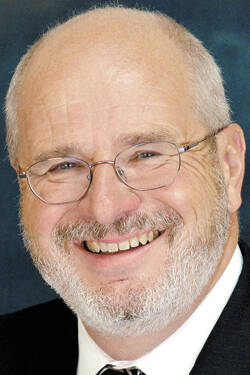In the end, Ukrainian President Volodymyr Zelenskyy’s message to the assembled members of the U.S. Congress was as old as scripture.
In Genesis, God asks Cain where his brother Abel is. Cain replies that he doesn’t know.
Then Cain asks the question that reverberates through time and formed the heart of Zelenskyy’s 20-minute speech and video presentation:
“Am I my brother’s keeper?”
The answer to that ageless question, of course, is yes. We all have duties and moral responsibilities to our brothers and sisters on this planet, regardless of whether they are linked to us by blood, ethnic heritage or faith.
Our common humanity is the bond that ties us together.
The repeated utterance of that profound but simple truth gave the Ukrainian president’s speech its tremendous emotional and even spiritual force.
Again and again, Zelenskyy reminded the members of the U.S. House of Representatives and the U.S. Senate—and, by extension, the American people—that this war of Russian aggression is not just Ukraine’s fight.
It is Europe’s fight.
It is America’s fight.
It is the world’s fight.
It is freedom’s fight.
To drive home the point, Zelenskyy interrupted his remarks to present a video about what life is like in Ukraine since Russia unleashed its onslaught.
The video featured images of ordinary life in Ukraine before the invasion began. We saw pictures of families at peace and children at play.
And we saw footage of it all blown apart—of families being shattered, of children crying, of children suffering, of children dying.
The message was not subtle, but it was effective.
The video reminded us of all the things human beings have in common. We all want to be happy. We all want ever better, more secure lives for our children and grandchildren.
And nothing inspires a greater fear in our hearts and even our souls than the thought that those we hold dearest are hurting or in peril.
When the video ended, Zelenskyy spoke for the first time in his speech in English, as if he wanted no barriers between him and us.
Speaking haltingly but movingly, he said that, at this critical moment in human history, it was not enough for him to be a leader of just his nation. He needed also to be a leader of the world.
“A leader of peace,” he said.
Then he called on U.S. President Joe Biden also to be a leader not just of the United States, but of the world.
Of peace.
Zelenskyy’s argument for the citizens of the United States and other freedom-loving nations of the world to increase their already considerable support for Ukraine’s struggle was as powerful as it was plain. He contended, persuasively, that we owed our support to Ukraine because Ukraine’s cause was humanity’s cause.
We are all in this together.
The greatest difficulty with moral imperatives, though, is not in determining whether one should meet them.
Rather, it is with how one should meet them.
Zelenskyy often has asked for the United States and the other nations of the North Atlantic Treaty Organization to impose a no-fly zone over Ukraine. Biden and other European leaders, not unreasonably, have worried that such an act would be equivalent to a declaration of war and thus would widen the fighting into a conflict that could ravage the entire globe for generations to come.
That is why Zelenskyy proposed an alternative. If NATO won’t establish the no-fly zone, he asked, then why not give Ukraine the fighter planes and other air defense systems necessary for the imperiled country to defend itself?
And, while we’re at it, why not keep imposing heavier and heavier sanctions on Russia and its leaders and put unrelenting pressure on any private entities still doing business in Russia?
Volodymyr Zelenskyy’s logic was unanswerable.
The question no longer is whether we should pursue any of these options. It is which and how many of them we should adopt.
Because the fundamental truth he spoke is as valid as it was in biblical times.
As human beings, we have a duty to freedom and to peace.
We have a responsibility to our fellow human beings.
We are, as we always have been, our brothers’ and our sisters’ keepers.
John Krull is director of Franklin College’s Pulliam School of Journalism and publisher of TheStatehouseFile.com, a news website powered by Franklin College journalism students.





